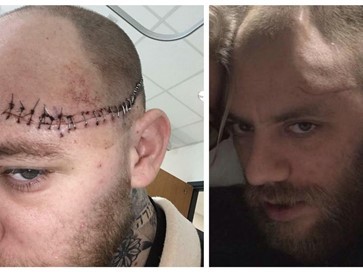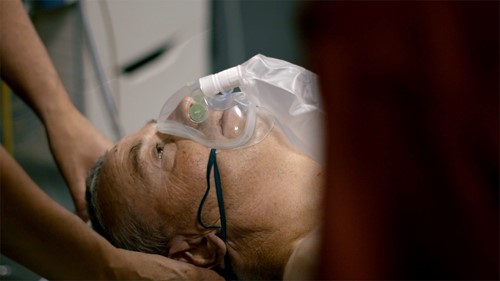
The father of one was transferred to the hospital's Coronary Care Unit where life-saving scans and tests revealed his aorta, the main artery in the body, had torn. His urgent surgery was to prevent a catastrophic rupture and any further bleeding. One in four people don't survive the operation.
His life-saving story will feature in Channel 5's ground-breaking documentary Critical Condition on Wednesday 20 March at 9pm. The documentary follows in incredible detail the staff and patients at Royal Stoke University Hospital as they confront the realities of delivering immediate life-saving care.
Today Gary, from Tean, Cheadle, said: "I had been in Belfast for a few days and had picked up a bit of a tummy bug and as I was getting over that I started to feel that every time I lay down someone was sitting on my chest. I thought it was all connected. I left it three days before calling 111, I just thought I'd pulled a muscle or something so was quite shocked when they sent an ambulance immediately.
"Once I got to hospital I had a few quick checks before being admitted to the Coronary Care Unit and within about 10 minutes of having a full scan they were down telling me I needed heart surgery almost immediately."
The 49-year-old required urgent surgery to prevent a catastrophic rupture and any further bleeding. The operation is dangerous and one in four people don't survive the operation.
With every minute making a difference, he had to make an instant decision whether to go ahead and say goodbye to his family before going to theatre.
"The risk of you dying is actually pretty large. We are talking probably in the 20 to 25 per cents, but we have to weigh up the risks and benefits really and potentially the longer we leave this per say there is a chance this thing may rupture completely, and if that happens you won't survive," Gary is told in the documentary.
Gary said: "Everything changed straight away with a real sense of urgency but at the time I had no worries about it all, I knew it wasn't my time so I said goodbye to my Dad and my boy with no worries at all.
"They took me down to surgery and I woke up nine hours later, the following two days are a bit of a blur but I was discharged three days after the operation. I am still having rehab so it is low going but I am getting there," he added.
Richard Warwick, consultant cardiologist, who performed the life-saving procedure said: "We very seldom have emergencies when it comes to heart operations but having an aortic dissection is one of those rare occasions when it falls into this emergency bracket."
No stranger to the emergency department at RSUH, Gary, 49, has been involved in a number of bike accidents and has 13 pins in his arms and legs.
"Compared to the surgery I have received following bike accidents, this has been the most painless and easy to recover from, I can't thank the doctors and nurses enough for the care I have been given."
The next episode of Critical Condition also includes Kieran who is flown in by helicopter after being involved in a major car accident. He is critically ill with multiple injuries and two ruptured arteries. The first battle is to try and stabilise him, before senior doctors can decide what the best next treatment is for Kieran.
Roy arrives at hospital as something is affecting his thinking. He's seen by the stroke team, who discover he has a blood clot in his neck and needs emergency surgery to remove it. Roy's wife Tina, waits anxiously in the corridor as the extraordinary procedure is carried out.
And finally, Jonty arrives after falling through a skylight on a roof. He has numerous broken bones across his body, but the team are worried that he might also have serious internal bleeding. They urgently need to investigate what else might be going on.
















